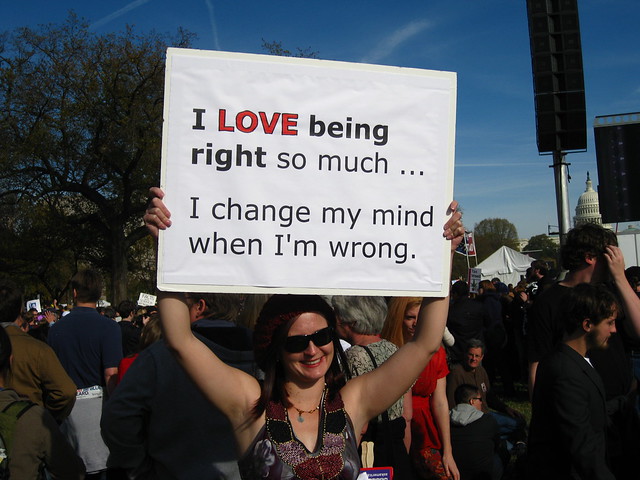One of the most damning bits of criticism we atheists have of religious believers is that many of them admit that there is no amount of evidence that would change their minds about the various gods in which they believe. When they ask us what would change our minds and persuade us to believe, we are generally able to provide answers; however, many religious believers say that there is nothing that could convince them that they are wrong about their gods. "My mind is made up," they say, "don't confuse me with the facts."
Any rational person should be capable of and willing to change his or her mind in light of new information. None of us knows everything, and all of us are wrong about a great many things on a regular basis. If I have a strong opinion on a particular issue and new information surfaces, I need to consider it. If it turns out that I was wrong, I need to modify my opinion to incorporate the new information. If I refuse to do so, even in the face of overwhelming evidence that I am wrong, I can no longer claim to be rational. In such a case, I am placing my belief and its maintenance above reality. When it comes to questions of religious belief, it seems that most atheists understand this quite well.
Why then, does it seem like so many people, including some atheists, demand that political candidates and those elected to public office never change their minds? If we recognize that changing one's mind in response to new information is a mark of rationality, does this mean that we want our politicians to be irrational? It seems to me that a political candidate or an elected official who refuses to change his or her mind in response to new information is not only not rational but is likely to be an ideologue. I say this because it seems that most of the time one refuses to change one's mind in the face of new information one is doing so out of a devotion to an ideology of some sort. I don't know about you, but I'd prefer to elect rational individuals over ideologues.
During one of the early Republican primary debates, Jeb Bush was asked about the Iraq war and badly botched his response. He ended up saying something to the effect that he'd support his brother's decision to invade even if he knew everything we now know about the flawed intelligence and so on. This made him sound like an ideologue and a moron; he quickly issued a statement changing his answer and attempted to blame the debate moderator for confusing him. Issuing the correction was a smart move on his part even though the initial blunder was not a great moment for him.
Hillary Clinton has rightly been subjected to a great deal of criticism for supporting the war in Iraq when she was a senator. Unlike Jeb, who had no meaningful authority at the time, she voted in support of the war as a senator. I suspect that this vote, as much as anything else, cost her the Democratic nomination in 2008. In her current campaign, she says that her vote was a mistake and that she regrets it. Assuming that one is inclined to believe that she is being truthful when she says this now, I think it is a good thing that she has changed her mind. This is what we'd expect of a rational person. Just look at how ridiculous Dick Cheney seems when he still cannot manage to admit that invading Iraq in response to 9/11 was a mistake.
It puzzles me to hear people who say that they'd like to see more reason in politics and describe themselves as freethinkers dog-piling on candidates and elected officials for "flip-flopping." We should be rewarding those who change their minds in response to new information, not criticizing them for it. I'd love to hear a candidate or elected official say something like this during an interview or a debate:
You're correct. That was my position. At the time that vote was taken, I believed I was doing the right thing because [provide rationale for the decision]. Since then, I have learned [describe relevant new information]. This has led me to change my mind. I now believe [describe current position].
I'd like to see this delivered in a calm, matter-of-fact way. And then when the opponent, moderator, or interviewer inevitably attempts to make it an issue, I'd like to hear the candidate or elected official feign surprise and then calmly explain that changing one's position in response to new information one did not previously have is precisely what we should all demand. After all, how desirable is the alternative?
